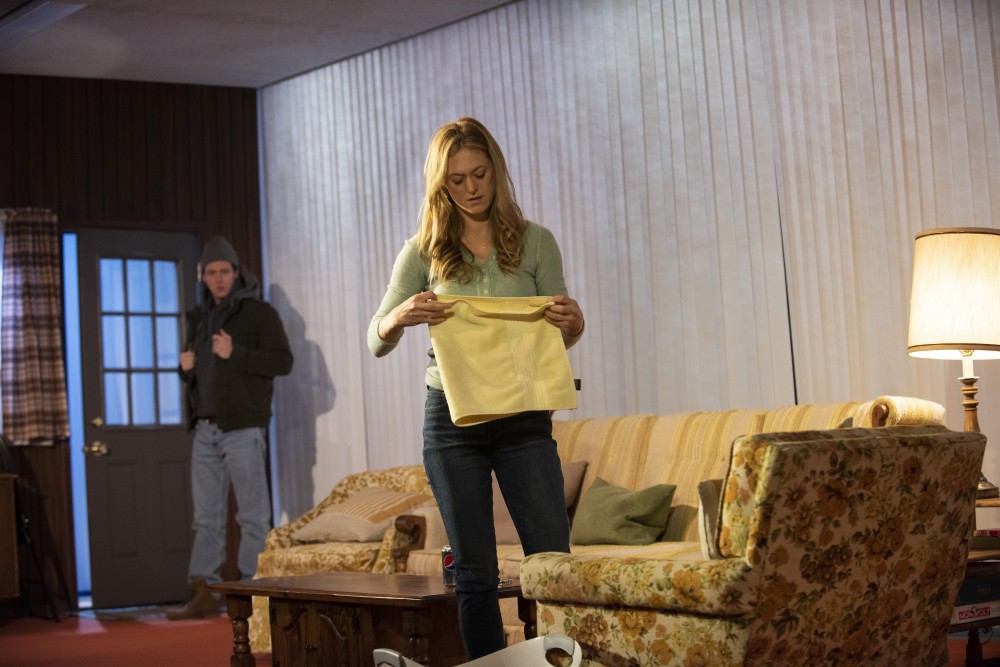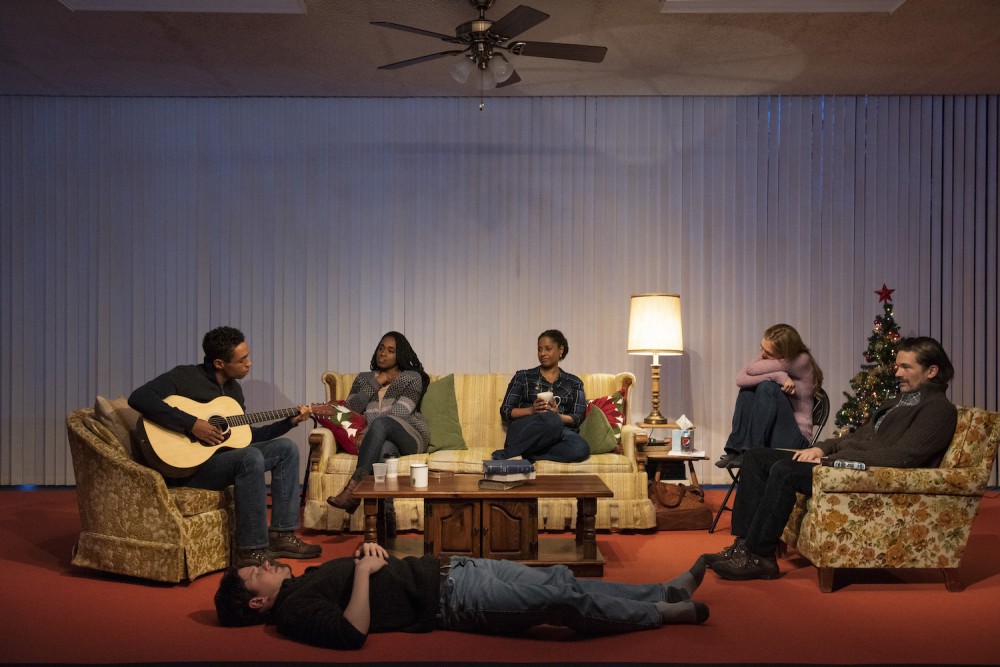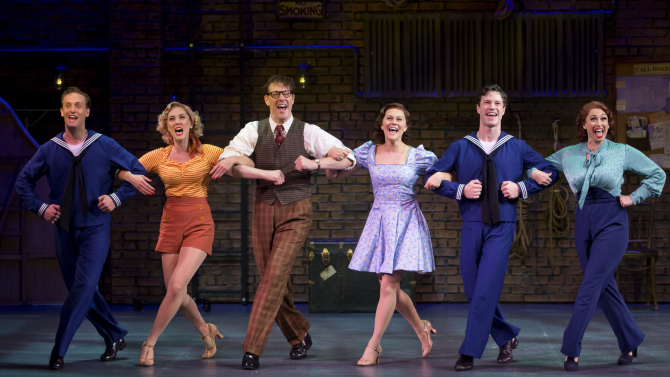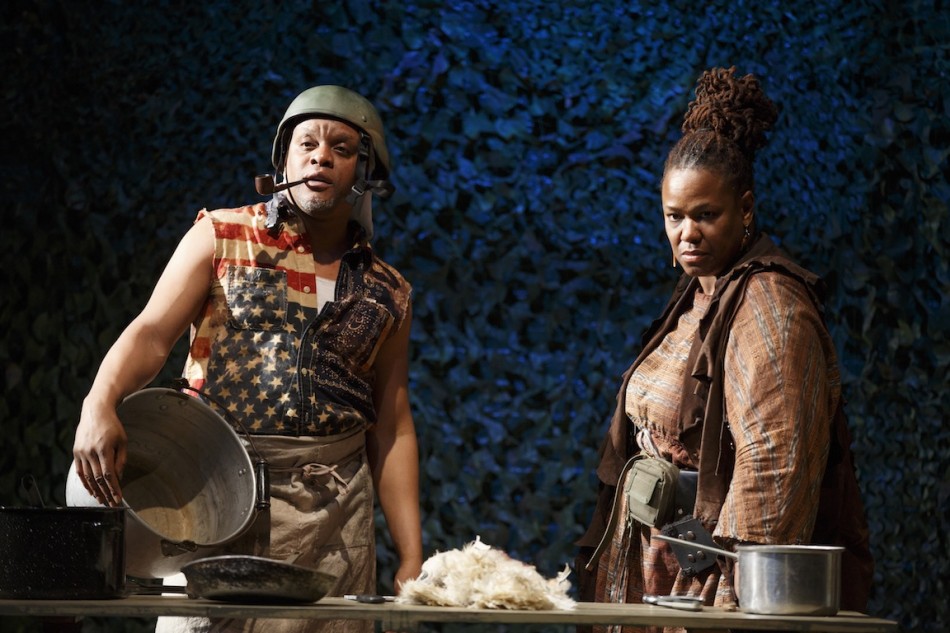by Michael Bracken
A study in perpetual motion. That’s how Marin Ireland comes across as Alison in Abby Rosebrock’s fetching Blue Ridge at the Atlantic Theater Company’s Linda Gross Theater. Her nonstop movement is especially noticeable at the top of the play, when, among other things, her leg refuses to stop shaking. She calms down a bit as the drama progresses, but just when you think she’s achieved a smidgen of tranquility, she slaps herself in the face or beats her head.
High energy with low self-esteem, Alison is funny and plain-spoken, masking her insecurity with flippancy, perhaps unaware that she’s doing so. Ireland, with a body that’s surely made of rubber, twists herself into any number of shapes and attitudes. She gives Alison so many facets you may at times forget that Alison’s driven by a combustion chamber of anger that’s often (but certainly not always) unexpressed. The only resident of St. John’s Service House who’s not an addict, she’s there because she took an axe and mutilated the car of her married lover and boss.
Blue Ridge is set in the common room of a halfway house somewhere in the Blue Ridge Mountains. The other inhabitants, when Alison arrives, are Cherie (Kristolyn Lloyd), who carries a torch for an initially unidentified man from Tennessee, and Wade (Kyle Beltran), a guitarist who teaches himself songs as the play progresses. Cole (Peter Mark Kendall) arrives some time after Alison, straight from a mental institution.
The quartet is overseen by social worker Grace (Nicole Lewis) and pastor Hern (Chris Stack). There is a synergy among the likable cast that reflects the synergy among the residents and Grace. Hern is in a class by himself, at least as far as Alison is concerned. She takes an almost instant dislike to him, which is magnified tenfold when she learns he is Cherie’s man from Tennessee.
Director Taibi Magar brings an effortless grace, with a decided drawl, to Rosebrock’s flowing script. Nothing seems forced or hurried. While Blue Ridge revolves around Marin’s Alison, it neglects none of its other characters, and themes overlap. For example, Alison’s leitmotif, abuse of power by men of power, is writ large in the relationship between Cherie and Hern.
Racism is handled with refreshing honesty and economy. Wade talks about the white girls in school, whose parents wouldn’t let them go out with him once they learned he was part black. He wonders if Hern’s hand in shortening Alison’s stay has any racist implications, since Hern opposed Wade’s leaving early. He tells Alison she wouldn’t go out with him because of his color. Yet he doesn’t whine or dwell upon things or seem bitter. He merely observes and comments.
Part of Blue Ridge’s appeal is its setting: safe houses don’t seem to make it to the stage very often, nor do the Blue Ridge Mountains. Adam Rigg’s set creates the perfect mood: warm enough to approximate homey and cold enough to suggest institutional. The striped couch and two patterned armchairs, along with various lamps, are eminently ordinary.
Blue Ridge is a quiet play, but it’s never dull. It has its occasional explosions, and its dialogue is peppered with literary allusions, humor, and unexpected personal details. Its characters are well-etched. Firmly anchored by Marin’s Alison – if a character so frenetic can be an anchor – it tells a story that’s surprisingly satisfying in its lack of resolution and surprisingly engaging given its deceptively meandering pace.
Photos: Ahron R. Foster
Through Saturday, January 26th, at the Atlantic Theater Company’s Linda Gross Theater (336 West 20th Street). https://atlantictheater.org/ . 2 hours 5 minutes with one intermission.

























